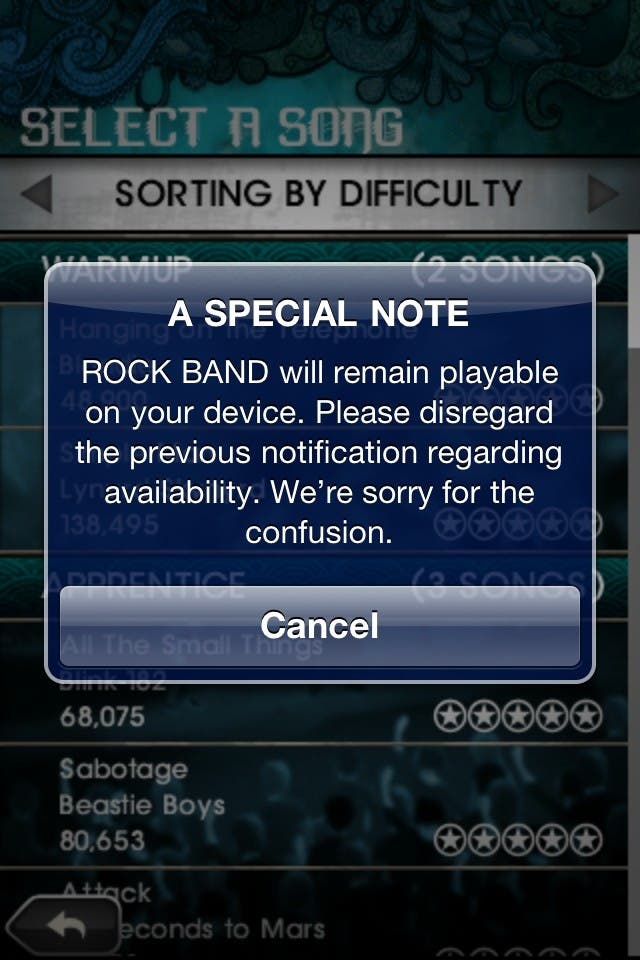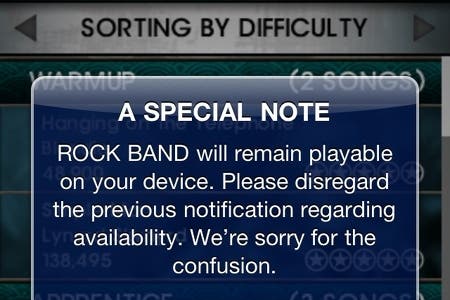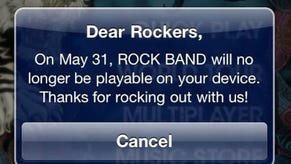Rock Band iOS case highlights EA's digital EULA policy
Eurogamer unearths the buried small print.
EA's (now withdrawn) decision to cancel support for Rock Band iOS has highlighted the cover-all nature of its mobile gaming EULA policy, which is largely inaccessible until a player has already paid for the game.
Rock Band iOS, like most mobile games, does not offer users easy access to its end-user licence agreement until after the title has been bought, downloaded and booted up.
But even then, you'd be hard pressed to find the documentation. This can be located by tapping on the "Extras" menu, then the "About" setting, then "Legal info", then "End User Licence". This opens up the phone's web browser and points players to a generic, US-orientated EULA document.
The document is also available directly from EA's policy website, but phones kept offline have no method of reading the game's EULA at all.
Before choosing to read the EULA, players are presented with Rock Band iOS's "Legal Info" blurb, which states that by simply buying the game, players agree to use it on EA's terms, whatever they are.
"By purchasing and/or using this application, you agree to the terms of the End User Licence Agreement and EA's Privacy Policy and Terms of Service," the blurb reads. It is a standard message across EA Mobile software.

The proviso is placed above the links to EA policy documents and is included within the app itself, rather than online. This means users will likely agree to it before they've had a chance to actually read and understand what it is they've agreed to.
"Use is at your sole risk. EA does not warrant against interference with your enjoyment of the application; that the application will meet your requirements; that operation of the application will be uninterrupted or error free."
EA's mobile gaming EULA
The online EULA document states that "if you do not agree to the terms of this License, EA's Privacy Policy and/or EA's Terms of Service then do not install or use the Application".
That this is only available to read after purchase, means that any customers who do bother to read it, and then disagree with EA's terms, will be left out of pocket. Players can petition for a refund, but this will have to go through Apple's own iTunes support process.
EA also declares in the EULA that it can change the EULA any time it wishes. Therefore, it's up to you to keep abreast of the changes by regularly re-reading the document: all 6307 words of it, including appendices.
The EULA states that paying for the game simply grants users a "limited, non-exclusive licence" to the app, and that EA reserves the right to update the game at any point with any "reasonably necessary" features.
"Use is at your sole risk," the document declares. "EA does not warrant against interference with your enjoyment of the application; that the application will meet your requirements; that operation of the application will be uninterrupted or error free."
The EULA explains that by using the game, players "waive the right to a trial by jury or participate in a class action". This is important, as the legal enforceability of EULAs has historically been a grey area, especially when policy documents are only accessible after a game has been purchased.
In one case, an EULA was found to be legally enforceable where a user was able to reject the policy after purchase by returning the boxed software within 30 days. But in another example, the fact that a user had already bought a piece of software before reading terms inside the box meant that the licence was not enforceable, since the customer had never agreed to it before their purchase was completed.



